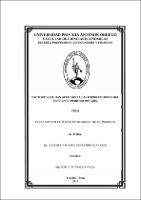Factores que han afectado a las exportaciones del Perú en el periodo 1997 - 2016

View/
Download
(application/pdf: 1.504Mb)
(application/pdf: 1.504Mb)
Date
2017Author(s)
Benavides Olivares, Lourdes Vanessa
Metadata
Show full item recordAbstract
La investigación tiene como objetivo determinar cuáles son los factores que han afectado
a las exportaciones del Perú durante el período 1997-2016, por cuanto es muy importante
conocer la magnitud de la incidencia de los mismos factores sobre el comportamiento de
las exportaciones peruanas.
Para el desarrollo del presente trabajo se ha recopilado datos de los reportes estadísticos
del Banco Central de Reserva del Perú, de la Asociación de exportadores y de la Reserva
Federal, luego se elaboró gráficos que permitan observar la evolución de los factores
considerados (apertura comercial, PBI de Estados Unidos, Términos de intercambio, Tipo
de cambio real multilateral y de las exportaciones peruanas). Finalmente se estimó el
modelo econométrico para determinar la magnitud de la incidencia de los factores en las
exportaciones.
La teoría y los antecedentes revisados en este estudio sugieren que el tipo de cambio real
multilateral y los términos de intercambio determinan las exportaciones. Sin embargo,
nuestra evidencia empírica, refleja parcialmente esta realidad, tal es así que los términos
de intercambio tienen una relación positiva con las exportaciones, ya que, si estos
aumentan en 1%, las exportaciones aumentaran en 0.77%, en tanto que el tipo de cambio
real multilateral presenta una relación positiva pero no significativa con las exportaciones,
lo cual va en contra de la teoría y de lo que esperábamos. También se consideró el PBI de
Estados Unidos en el modelo, encontrando que se relaciona directamente con las
exportaciones peruanas, ya que si aumenta en 1% el PBI, las exportaciones aumentarían
1.32%.
La investigación también concluye que la incidencia de la apertura comercial, durante el
periodo 1997-2016, tiene una relación directa, por lo que se requiere diversificar los
mercados destino para no estar expuestos a los factores negativos que generan los
términos de intercambio, cuando estos disminuyen por comportamientos de la economía internacional, o por entorno de crisis mundial en economías internacionales, en donde
una diversificación de mercados destino atenuaría el efecto de dicho entorno. The research aims to determine the factors that have affected Peruvian exports
during the period 1997-2016, since it is very important to know the magnitude of
the incidence of the same factors on the behavior of Peruvian exports.
For the development of this paper, data have been collected from the statistical
reports of the Central Reserve Bank of Peru, the Association of Exporters and the
Federal Reserve, and graphs have been prepared to observe the evolution of the
factors considered (trade liberalization, United States GDP, Terms of Exchange,
Real Multilateral Exchange Rate and Peruvian Exports). Finally the econometric
model was estimated to determine the magnitude of the incidence of factors in
exports.
The theory and background reviewed in this study suggest that the multilateral real
exchange rate and the terms of trade determine exports. However, our empirical
evidence partially reflects this reality, so the terms of trade have a positive
relationship with exports, since if they increase by 1%, exports will increase by
0.77%, while the type of multilateral real exchange presents a positive but not
significant relationship with exports, which goes against theory and what we
expected. The United States GDP was also considered in the model, finding that it
is directly related to Peruvian exports, since if GDP increases by 1%, exports would
increase by 1.32%.
The research also concludes that the incidence of trade liberalization, during the
period 1997-2016, has a direct relationship, so it is necessary to diversify the target
markets so as not to be exposed to the negative factors generated by the terms of
trade, when These are reduced by the behavior of the international economy, or by a global crisis environment in international economies, where a diversification of destination markets would attenuate the effect of this environment.
Collections
- Economía y Finanzas [87]

